
Familiesonline.co.uk Families Dorset 1 Issue 27 January/February 2023 Familiesonline.co.uk FREETakeMeHome Independent School for Girls aged 3-18 Talbot Heath Find out more. Register online for our Kindergarten, Pre-Prep and Junior School Open Morning Friday 3rd March THINK THROUGH Talbot Woods | Bournemouth | Tel: 01202 763360 | talbotheath.org/openday | Connect with us @TalbotHeathSch | Day and boarding Talbot Heath Junior pupils are now guaranteed a highly sought after place in our Senior School - see our admissions policy online for criteria Now that is reassuring. Dorset
c


l w
e
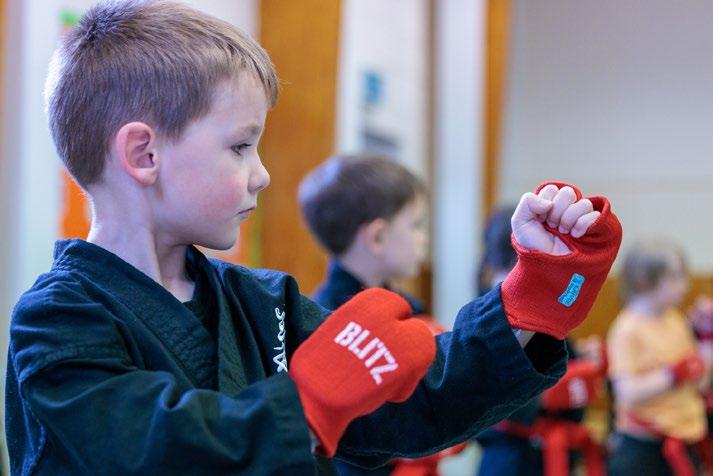
t a b l i s h e d i n 1 9 2 8 a n d h a s g r o w n i n t o a v i b r a n t , t h r i v i n g a n d v e r y h a p p y s c h o o l o f o v e r 3 0 0 b o y s a n d g i r l s C h o o s i n g t h e r i g h t s c h o o l i s o n e o f t h e m o s t i m p o r t a n t d e c i s i o n s t h a t y o u a s a p a r e n t w i l l m a k e f o r y o u r c h i l d I f y o u a r e l o o k i n g f o r a s c h o o l t h a t c o m b i n e s g r e a t a c a d e m i c r e s u l t s w i t h s p e c i a l c a r e f o r e a c h i n d i v i d u a l , t h e n y o u m a y l i k e t o c o n s i d e r P a r k S c h o o l . P l e a s e s c a n t h e Q R c o d e t o b o o k y o u r s p a c e . H o w e v e r , i f y o u c a n n o t m a k e t h e s e d a t e s , w e a l s o o f f e r p r i v a t e t o u r s S i m p l y e m a i l a d m i s s i o n s @ p a r k s c h o o l c o u k t o b o o k y o u r v i s i t w i t h o u r h e a d t e a c h e r . W e l o o k f o r w a r d t o s e e i n g y o u s o o n .



Familiesonline.co.uk Families Dorset 2 WHAT’S ON Callus today! EFBournemouth|01202767555|accommoda�on.bournemouth@ef.com Hos�nganinterna�onalstudentis awonderfulexperiencetodiscover otherculturesandmeetnewpeople. Jointhecommunitytoday! Youhavewhat ittakestobea greatEFhost! P
a r k S
h o o
a s
s
P A R K S C H O O L , 4 3 Q U E E N S P A R K S O U T H D R I V E , B O U R N E M O U T H , D O R S E T , B H 8 9 B J T :
0 1 2 0 2 3 9 6 6 4 0 E : O F F I C E @ P A R K S C H O O L C O U K PARK SCHOOL
Morning 26 January Polite. A
R
Kind
S c a n t h e Q R c o d e t o b o o k y o u r s p a c e !
Open
mbitious.
esilient.
Welcome
Happy New Year from all of us here at Families!
This really is a great time of year to focus on getting healthier –but it’s difficult to do it on your own. So how about taking on a health challenge as a family instead and motivating each other? Or work on some strategies for alleviating your child’s anxiety?
Try a new life hack?
As the kids head back to school or nursery for the new term, we also have a great article on dealing with toddler tantrums, as well as a focus on education including an update on SATS and tips for getting the best out of online tutoring. You can also find out why shared reading is so great for your child’s language development.


Buxton Press Design Rebecca Carr Editor, Families Dorset Linda

Finally, our children lead sanitised lives these days. Yet ageappropriate risk is key for a balanced childhood. So why not let your child try some dangerous things – safely.

In this issue


4. 9. 10. 12. 14. 15. Follow us Book now to include your business in our Mar/Apr issue Call Claire on 07812 218331

Familiesonline.co.uk Families Dorset 3 CONTENTS A BETTER FUTURE STARTS HERE JUST DON’T FORGET YOUR HATS Help young minds thrive, fund vital research, and give hope to those in need. GET INVOLVED www.wearahatday.org Brain Tumour Research Registered charity number 1153487 (England and Wales) SC046840 (Scotland) Friday 31st March 2023
Contact us
Editor Linda Stone editor@familiesdorset.co.uk 020 8241 0423 Sales Claire Clarricoates claire.clarricoates@familiespublishing.co.uk 01494 689098 or 07812 218331 Printed by
Education Early Years New Year, New You Health Dangerous things (you should let your child do) Parenting September/October competition winners Congratulations to all our winners. You can find a list at https://bit.ly/SOrecipients Families is a registered trademark of LCMB Ltd, Remenham House, Regatta Place, Marlow Road, Bourne End, Bucks SL8 5TD. The contents of this magazine are fully protected by copyright and none of the editorial or photographic matter may be reproduced in any form without prior consent of Families Print Ltd. Every care is taken in the preparation of this magazine but Families Print Ltd, its distributors, franchisees and LCMB Ltd cannot be held responsible for the claims of advertisers nor for the accuracy of the contents, or any consequences thereof.
SATS: getting in the know
By Jessica Joan
In May, Year 2 (KS1) and Year 6 (KS2) pupils will take their SATS exams. Yet, from their very first day at school, children are being trained to be able to perform in preparation for these assessments.
So much work goes on behind the scenes in other years to get children ready and when it comes to the year in which they take their SATS, teachers are under pressure for them to do well.
To prepare for the exams, your children will be doing lots of maths, reading and writing at school, intertwined with other subjects so that they are consistently practising those skills. Sometimes this means that other foundation subjects are deemed ‘not as important’ and additional maths and English lessons squeezed in instead.
So how can you ensure your child does well in their SATS?
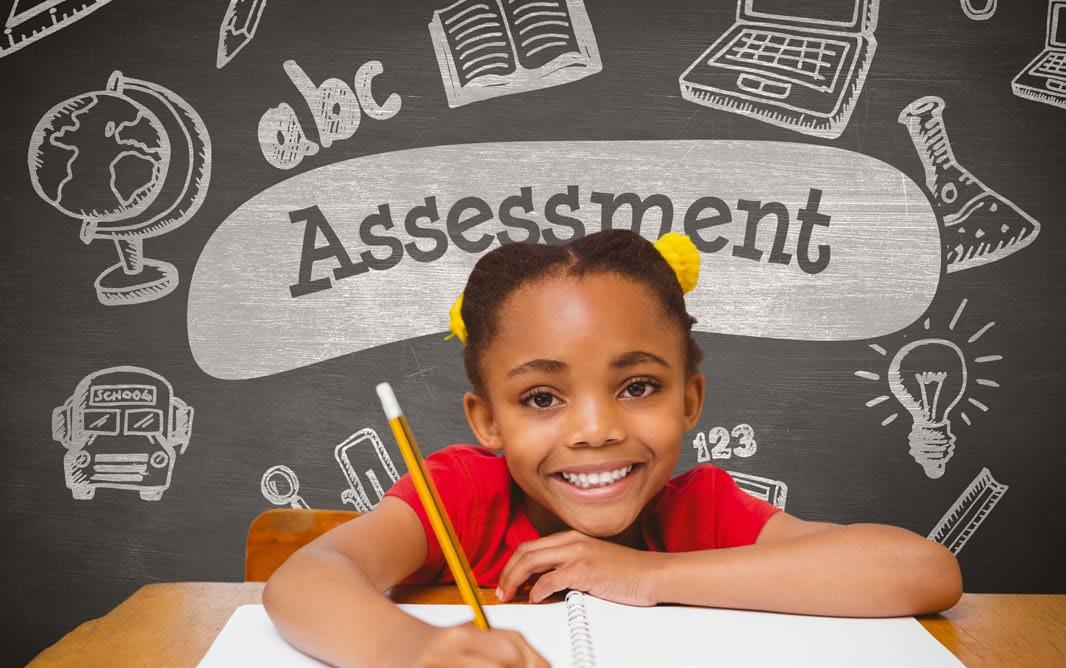
Your child’s school will more than likely be sending home maths, English and reading homework in preparation. It can be difficult to make your child do homework, especially when they have been worked so hard during the school day; however, it’s an important support in preparation for SATS so anything you can do with your child can really make a difference to how they perform.
Providing your child with any opportunity to read, write and do mathematical calculations will be massively appreciated by your child’s teacher!
In addition, you can download and look at past SATS papers
from previous years (www.sats-papers.co.uk) to get an idea of what your child will have to do. There will be some things that have changed since you went to school so ask your child to show you how they do things - they will relish this opportunity!
Likewise, you can always speak to your child’s teacher who will happily show you how you can support your child’s learning at home.
As well as these things, ensuring your child eats well and stays hydrated will support their minds and bodies during the school day. Similarly, creating a good bedtime routine will mean your child gets a decent night’s sleep and has the brain power to be ‘on the ball’ throughout the school week.
Jessica Joan is a primary school teacher from Worcestershire with a ten year teaching career. After experiencing burn out, she set up as a Work/Life Balance Coach for stressed out teachers and launched her Happy Teacher Course. Find out more at www.jessicajoan.co.uk
Yarrells: a gem of a school
creatively, as well as gain deep knowledge and understanding in academic subjects. I have always believed it’s possible to create an excellent educational environment that meets the needs of all abilities, is broad and rich in its curriculum base and doesn’t compromise on quality.
Yarrells has an enviable academic reputation, with the pass rate for 11+ entry sitting at ninety five percent in 2022 but, for the school, it’s far from being just about results. It’s about each pupil and building a relationship with them: finding out what makes each child unique, what they need in order to thrive and then ensuring the school provides that. It’s a statement of fact that every child at Yarrells makes excellent educational progress against their starting points.
‘I will happily shout from the roof-tops that education should not be a ‘one-size fits all’ programme,’ says Sally.
The Head of Yarrells School and Nursery, Sally Moulton, is absolutely delighted with the outcomes of the school’s recent inspection report. The school achieved the highest possible results and was recognised as providing excellent education in all sixteen areas covering educational quality and pupils’ personal development.
Sally says: ‘I adore leading Yarrells and have always known it is a gem. I am passionate about providing the best possible education for young people and the opportunity to learn in a wide range of subjects, including meaningful learning experiences in sport, music and the creative and performing arts.
‘I believe children need a protected space in which they can learn about themselves, grow in self-expression and self-confidence and explore the world imaginatively and
‘At Yarrells, we tailor our curriculum to meet the needs of each child. To have received the external validation from the Independent Schools Inspectorate that we do this excellently, in every area of education, confirms to me that we have been successful in creating this vitally important environment in which children flourish under our care.
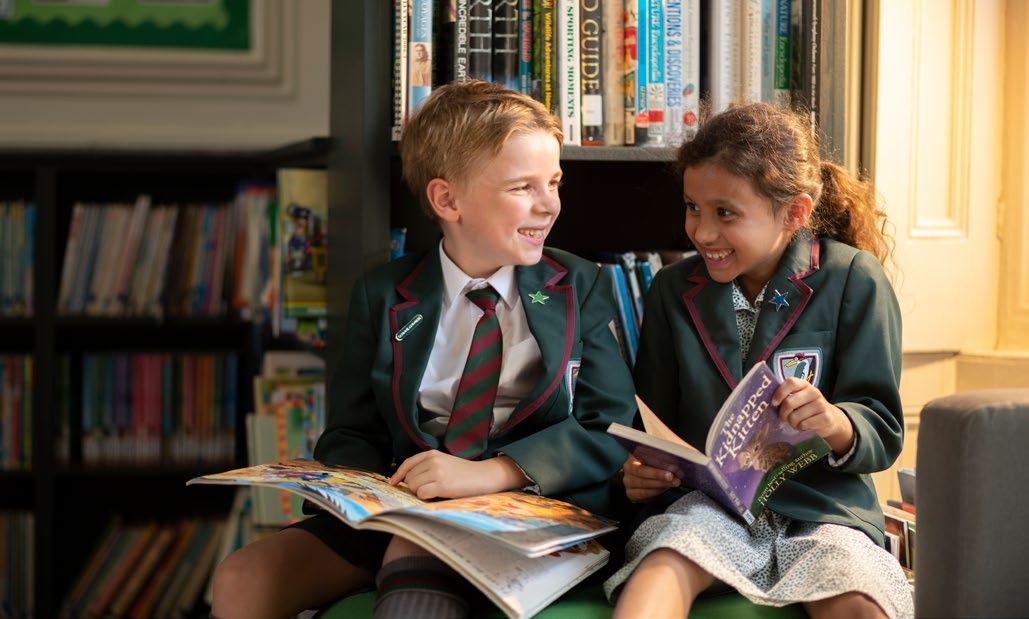
‘Yarrells is truly special and has a deep hold on my heart. I am very excited about where the next five years will take us and am completely committed to leading the school on that journey.’
To find out more about Yarrells, a school for boys and girls ages 2 to 11 in Upton, Dorset, visit www.yarrells.co.uk
Familiesonline.co.uk Families Dorset 4 EDUCATION
Yarrells

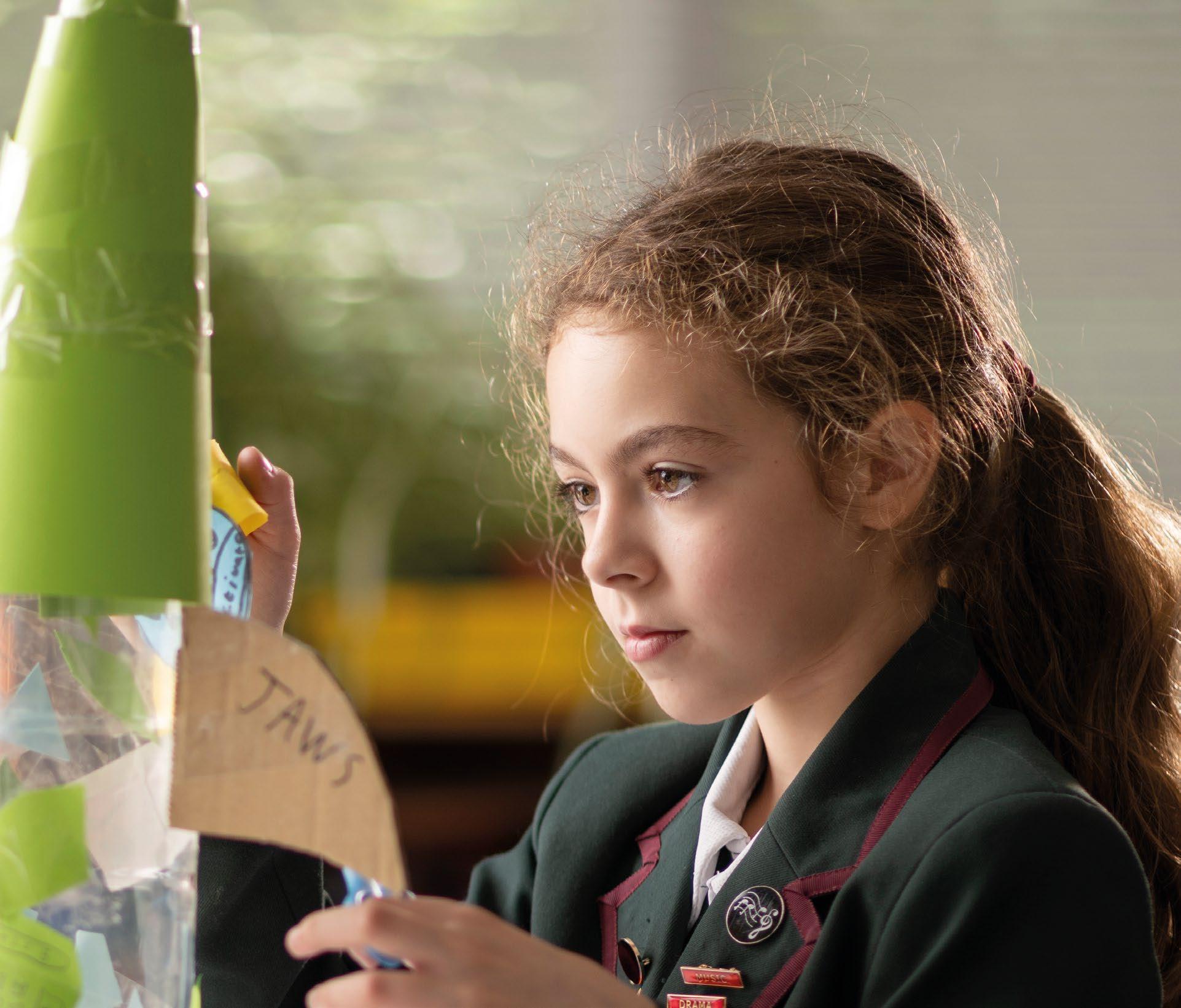

Familiesonline.co.uk Families Dorset 5 • Enriching environment • Competitively low fees • Specialised subject teachers from age 5 • Dynamic and extensive curriculum • Dedicated nursery for 2 to 4 year olds • Proven exam results at 11+ • Minibus routes from Dorchester, Swanage, Bournemouth & Poole 01202 622229 | Upton, Dorset | yarrells.co.uk
School and Nursery Preparatory School for Boys & Girls 2-11
“Pupils have outstanding attitudes to learning.”
“The quality of the pupils’ personal development is excellent”
“Pupils are deeply knowledgable across all areas of learning.”
“Pupils show deep self-awareness”
“The quality of the pupils’ academic and other achievements is excellent
Meet the Head
Why do you think the school has such a glowing reputation locally?
Park is a long-established school at which children are renowned for academic achievements, as well as for becoming well-rounded, life-long learners.
How do you involve parents in school life?
Parents are welcomed into school at all times. They are invited to school shows and class assemblies each term and to annual family events, such as Sports Day, Carol Service, Speech Day and ParkFest.
How do your teachers develop partnerships with the children they teach?
The most important feeling for any child is to know they are valued and respected. Our teachers take the time to find out about each child’s home life, passions and aspirations so they can support and develop these. I know every child by name and engage with them all each week. Having these connections enables the children to explore their feelings and develop their learning in a safe and secure environment.
How does Park School go about developing the whole child?
Our wide curriculum, built upon the foundation of life-long learning, includes weekly art, sport and music with specialist subject teachers, so all children, no matter what their passion, can enjoy developing their skills. Our PARK values, Polite, Ambitious, Resilient and Kind, provide the bedrock on which children build the life skills to succeed throughout their learning journey.
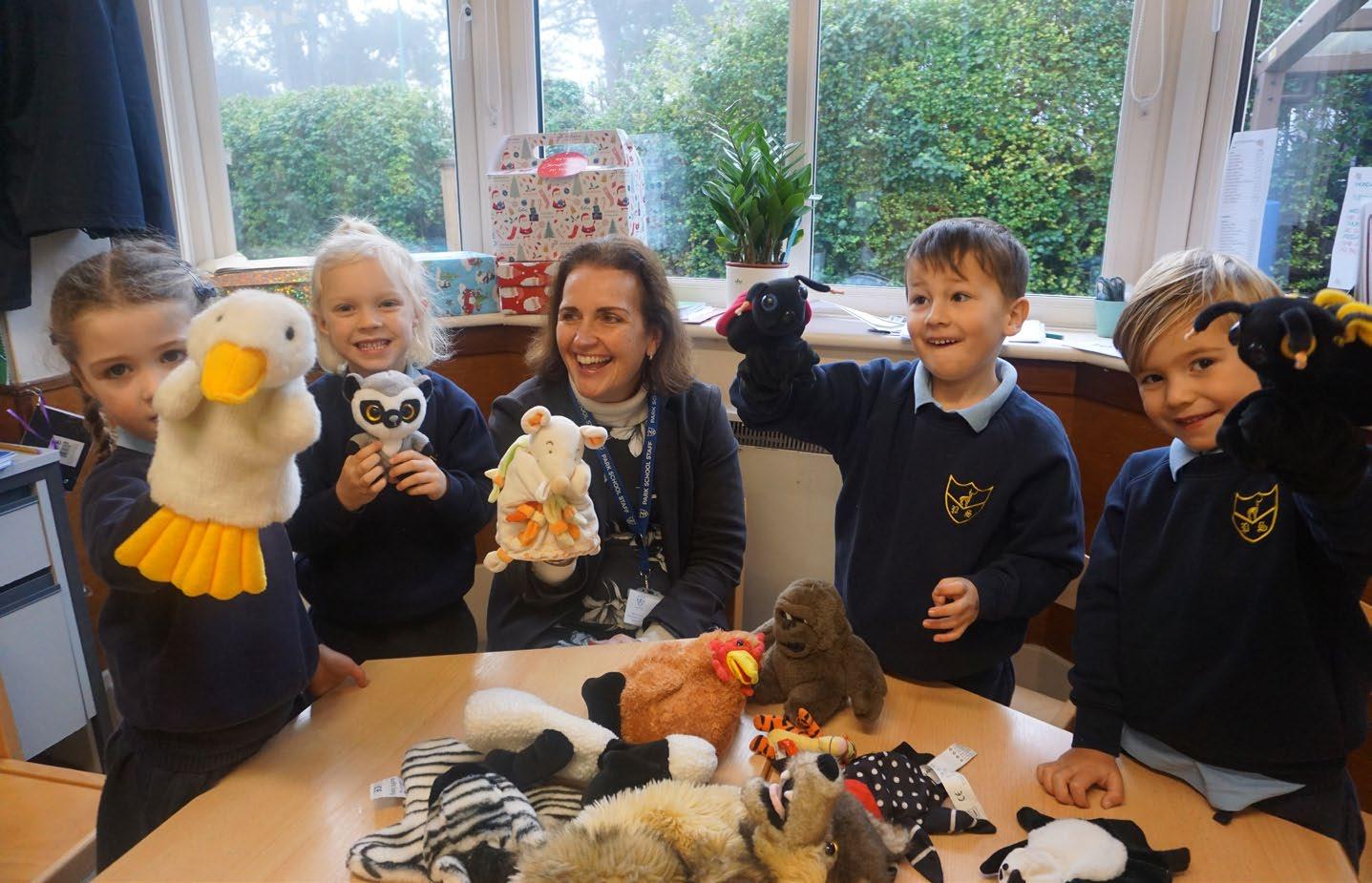
What is your biggest challenge and biggest achievement?
My biggest challenge is ensuring I can give enough time to children, parents and staff. My office door is always open and only by listening to their needs and wants can
I evolve Park into an even better school. My biggest achievement is introducing the PARK values which define how the Park community works and plays together. Every pupil knows these values and demonstrates them daily.
What are your strengths as a leader?
I pride myself on being a good listener and a team player. I lead by example but being a team player also means I give responsibility to others to develop their leadership skills and take charge of projects they are passionate about, which benefits the whole school.
What’s your vision for the school for the next five years?
As part of the continuing development of the PSHE curriculum which supports and frames pupils’ attitudes, wellbeing and resilience, we are appointing a dedicated Pastoral Officer who will give time and targeted support to every child.

Meet the Head Special feature
We are also developing digital learning across the school, enhancing problem solving by using Beebots and Lego Spike kits, as well as coding. Additionally, I want to support and extend Park’s more able pupils beyond the standard curriculum.
How are your personal values reflected in those of the school?
I have a strong family ethos and this is reflected in the PARK values and community spirit that defines the school. What makes you particularly proud of your early years provision?
Our two wonderful nurseries and amazing Reception year, including The Forest School and Beach School provisions, allow children to develop their skills and wonder at the world around them through a wide range of learning opportunities. I am in awe of the patience and ingenuity with which our dedicated and hardworking Early Years Practitioners encourage and support these young children to achieve such terrific outcomes.
How does Park School achieve such an outstanding record at 11+?
We ensure pupils have the confidence to do their best under pressure by giving them opportunities both to excel and to challenge their resilience. It is by having great ambitions, backed by the determination to keep trying, that the children approach exams with confidence and positivity and are well-prepared for their future learning in a highly academic setting.
What co-curricular event do you most enjoy?
Every child takes part in a show at some point in the school year but my favourite is the Year 6 end of year musical. Seeing the young people that teachers and TAs have taught and nurtured perform to such a high standard with bags and bags of confidence makes my heart swell with pride.
What is your most useless skill?
I can tell who is parking outside my house by the sound of their car engine!
What is your real-life superpower?
I can read people’s minds - but I call it empathy. Being able to realise that someone needs help, advice or just a hug is really important.
Early bird or night owl?
Early bird definitely. I love to see the sun rising and appreciate the joy and anticipation of a new day and the new experiences it will bring.
Park School in Bournemouth educates boys and girls from 3 months to 11 years. Visit www.parkschool.co.uk for more information.
Familiesonline.co.uk Families Dorset 6 EDUCATION
Families chats to Melanie Dowler from Park School.
Getting the best from online tutoring
By Lisa Wander and Catherine Loble
With Covid and the move to online platforms, tutoring has become more accessible, with more options and opportunities available for tutors and students. As a result, over fifteen percent of children across the country are now receiving private tuition.

An Institute of Education study shows that well delivered tuition has a positive impact on attainment across the board. Certainly, in the highly competitive worlds of selective schools and public exams, tutoring has become the norm in ensuring that children are prepared and supported.
Today many parents turn to the internet to find a suitable tutor as it offers wider and often less expensive access to more options. But with it comes the concern around finding quality teaching in an unregulated world.
Online tutoring options are prolific on social media - you’ll likely get more offers than you could sift through in one evening! There are also many specialist online agencies offering a range of tutoring options, as well as A-level or undergraduate student tutors offering their services.
Employing an A-level or undergraduate student tutor may be advantageous in offering your child a positive role model.
Equally, your child may feel more comfortable with somebody closer to their own age and may therefore be more likely to challenge themselves and grow in their learning. This option can also offer a less expensive tuition route. However, it is really important to bear in mind that student tutors are unqualified and
inexperienced and don’t have the experience or understanding of child development.
In this exploding world of online tutoring, to give your child the best chance to succeed, you will need to do your research AND practise due diligence. Paying for a tutor is an important investment and cutting corners may do your child more harm than good.
Most educators recommend a robust academic assessment prior to hiring any tutor. For some children, an experienced tutor will be essential whilst for others a student tutor to support their learning can provide a wonderful experience. Either way, parents should be involved in what and how a tutor is planning for their child and have some degree of control and understanding of which topics will be covered.
Lisa and Catherine are co-founders of Emparenting (www.emparenting.co.uk), supporting children, parents and families with insights, skills and tools to nurture the development and well-being of the next generation.
Safe tutor selection
Meet your online tutor in a video call prior to engaging them and check their references thoroughly.
Consider their professional training as well as their general character and attitude.
Request qualification certificates and background checks.
Ask how they measure progress. Request regular feedback and that any homework is sent via you.
Ask for planning information. A professional tutor will never mind sharing this with you.
Sessions should only be arranged via parents; tutors should never contact your child directly.
Which platform will they use? Make sure that your child knows the rules around safety too.

Monitor online lessons by setting up in an open space in your home or leaving a door open if you are not in the same room.
Trust your instincts as a parent; if something doesn’t feel right, stop sessions and change tutors.
‘All Through’ at Talbot Heath School
Being an ‘All Through’ school means dedicated staff really get to know every pupil, building strong, supportive, nurturing relationships and guiding girls through all aspects of their development over many years. It also means a broad curriculum which provides great consistency and progression across year groups and key stages.
Younger pupils benefit greatly from the support and role modelling of the older girls, whilst older pupils develop empathy and leadership skills whilst working alongside younger pupils. The latest initiative for students is The Bridge, a volunteer mentoring programme where sixth formers support younger girls in maths and through Forest School.
Pupils attending the Junior School will automatically be offered a place in its Senior School if they are a positive role model, have a positive attitude to learning and standardised and teacher evidence of progress in English, Maths and Science. This eliminates the stress and anxiety of Entrance Examinations.
To reserve a place at the school’s Junior Open Morning (3 March 2023), visit www.talbotheath.org/openday

Familiesonline.co.uk Families Dorset 7 EDUCATION
Shared reading and language development
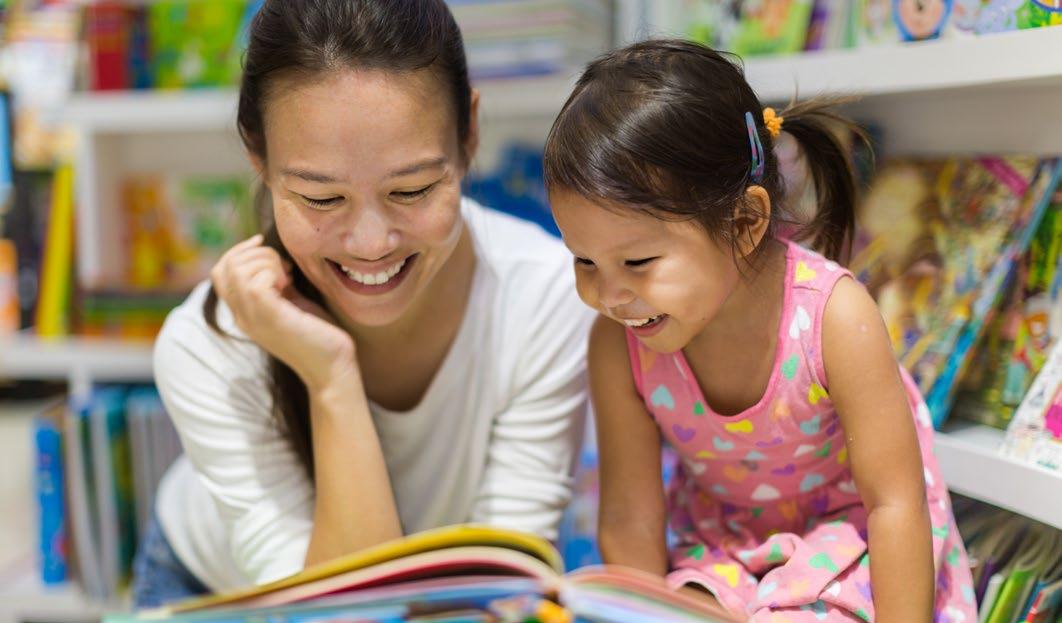 By Dr Jamie Lingwood
By Dr Jamie Lingwood
Early language development is incredibly important and sitting down to read with your child gives them a big advantage. Here are my thoughts on the how’s and why’s of shared reading.
Make it a conversation
Shared reading is so much more than simply reading books aloud from start to finish. It’s powerful as an interactive experience, creating a conversation along the way. Evidence suggests that asking children lots of open questions about books can really boost language skills. Exposure to new words builds their vocabulary and the more they hear spoken language, the more easily they can use it themselves. The earlier you start, the better their reading ages will be at school. Research has demonstrated how shared reading protects against a lot of language difficulties and delays. It can even predict how successful children could be as adults in terms of income!
Doing it your own way
Parents, grandparents, carers or sibling will each have their own reading styles; and that’s a good thing. Find the flow that comes most naturally to you, making the experience more interactive as you go along.
Picture books are a good start
Picture books with few or no words are great starting points. A good example is Hug by Jez Alborough, which simply repeats the word ‘hug’ on each page. It’s then down to the adult to create a story around this, starting a conversation with the child. Talking with them about what they see and what they think about the story naturally involves using a mix of words and grammatically structured sentences. The book becomes a prompt for children to express themselves.
Reading the same book over and over...
I hear this a lot from parents: ‘My child wants to read the same book over and over again.’ As an adult, what do you do? Do you read the book for the thirty fifth time this week or encourage
them to read something else? A recent study suggests that reading the same book repeatedly can help with a child’s memory, in terms of building familiarity with particular words. The biggest challenge is your stamina - knowing it’s all in a good cause might help here!
When and where?
When it comes to shared reading, little and often is the way forward. You don’t have to sit down and rigidly read with your child for a set hour at a time. Five minutes here and there is just as useful, particularly when it comes to keeping them motivated.
Fit reading around what works for you and the structure of your own lives. You may well choose a time towards the end of the day when you’re settling them down for bed. But for a lot of people, that isn’t successful because, by that point, their child is too tired to engage properly. Remember it doesn’t have to be bedtime. Pick a different point in the day. Or grab five minutes when you’re travelling on the bus together, for example.
And finally…
Do it yourself! When your child sees you reading and clearly enjoying it, they will want to copy you. This will help them develop a habit that will open up a lifelong world of adventures and learning.
Dr Jamie Lingwood is a Lecturer in Psychology at Liverpool Hope University (www.hope.ac.uk/psychology) and belongs to the ChildLab research group, a group of psychologists and educators who are interested in researching how children develop and grow.
‘Elaborative reminiscing’
This involves getting your child to think about a time that relates to them, prompted by the book. So, if the book’s narrative is about going to the zoo and seeing lots of animals, stop reading and ask: ‘Do you remember when we went to the zoo? Can you remember which animals we saw?’
This gets a conversation going and it relates the story specifically to your child’s own experiences. This exercise has been shown to boost language development, particularly for memory and vocabulary.
‘Re-casting’ technique
When a child is reading to a parent they will often come across a word they don’t know or struggle to articulate. Let them have an initial go at it, then instead of saying they are incorrect, let them hear the correct grammatical version. This is what we call re-casting.
For example, if they said: ‘The dog jump on the sofa’, you can say, ‘Yes, the dog jumped on the sofa, didn’t he?’ It’s a good strategy to adopt in shared book reading.

Familiesonline.co.uk Families Dorset 8 EDUCATION
Get muddy, get healthy
By Gabrielle Nash
Is your child always making mud pies, splashing in muddy puddles and making friends with worms, leaves or sticks? Do you embrace it or hate it?
We all have those memories of getting messy and muddy as a child but when it comes to our children, it can be difficult to allow them free rein. Yet scientific evidence now suggests young children who are encouraged to enjoy safe, outdoor muddy play will go on to develop stronger immune systems than children who are discouraged from it, leading to better overall health.

In the last decade, over sanitised childhoods have contributed to higher cases of allergies in the western world1. The percentage of children diagnosed with allergic rhinitis and eczema has trebled over the last thirty years.

Meanwhile, other studies have also found children who grow up on farms, with easy access to farm animals and the outdoors have a lower risk of developing asthma2. The reason behind these findings is an immune system that is exposed to bacteria and viruses when young and becomes strong, meaning it is much less vulnerable to allergies and asthma.
So how can you safely achieve muddy play?
The best way is to get your child outside as much as possible, from as young an age as possible. Touch trees, leaves, grass and mud. Play with sticks, jump in puddles and breathe fresh air. Forest schools are now a popular alternative to traditional indoor nurseries and forest school activities run by Forestry England and the National Trust are increasingly common during the school holidays.
Locate your closest natural play area - playgrounds made from natural materials; some even have options for den building and mud kitchens. Not only are you giving your child’s immune system a boost but being in the fresh air has countless other physical and emotional benefits. Instilling a love of the outdoors from a young age will continue the healthy habit of getting outside.
You can also give young children regular exposure to safe bacteria through mud kitchens and gardening. This helps bolster their immune systems from an early age, contributing
to a more diverse range of bacteria in the gut and skin. Recent research has found a direct link between diverse microbes in a child’s gut and potentially chronic conditions like obesity, diabetes and even healthy brain development. If you don’t have access to a garden, consider a local allotment or community farm project where children learn about how our food is grown AND get their hands safely dirty.
Children who grow up with a pet, especially dogs, are also known to have a healthier immune system because of the dirt an animal naturally brings in. Use common sense with this though. Don’t play in muddy areas to which cats or dogs have regular access so you can avoid harmful bacteria your child may not be used to. Always wash hands with warm soapy water.
Messy and muddy play requires patience and a relaxed attitude – from you!
Don’t put children in their best clothes outdoors; a second-hand puddle suit and old wellies will suffice.
Don’t wait for a sunny day. If the weather isn’t perfect, remember, you need rain to create that mud.
Get involved yourself. Just because you’re an adult doesn’t mean you have to miss the fun and it might even help your immune system!

The saying ‘a little bit of dirt never hurt you’ really is true.
1 www.allergyuk.org/about-allergy/statistics-and-figures/
2 www.newscientist.com/article/2206654-microbes-from-farms-may-protectchildren-from-asthma-even-in-cities/
Dive into amazing January membership offers at Purbeck Sports Centre and make fitness affordable in these testing times. Flexible, paid monthly with no contracts, memberships include family, off peak, student and youth options. This family-friendly centre prides itself on its lovely warm swimming pool, fabulous racket sports, Astro pitches, new state of the art gym and courses for kids and adults alike. Check out their website, email Purbecksportscentre@ dorsetcouncil.gov.uk or call 01929 500000.


Familiesonline.co.uk Families Dorset 9 HEALTH
January offers at Purbeck Sports Centre!
Let's dive into 2023 January Membership offers New Courses New Classes Fun kids activities Warm Swimming pool Flexible memberships Fabulous facilities Affordable prices in the beautiful market town of Wareham Make this your year ... Visit our website for more
Ten top tips for alleviating children’s anxiety
 By Claire Moreau
By Claire Moreau
Parenting is often marvellous and rewarding but it’s also complex, especially if your child is struggling with anxiety and you are unsure what to do next. Families asked Claire Moreau, a qualified mindfulness teacher, to share her tips for lessening children’s anxiety. Don’t be deceived by the simplicity of these…try putting them into practice – they do work!

Avoid fuelling anxiety
Children absorb emotions like sponges and if they don’t know how to manage them, they can feel frustrated, powerless and overwhelmed. Overhearing the news or emotionally-charged adult conversation can fuel children’s anxiety. Teenagers can be alarmed by news threads on social media. Besides climate change and Covid, younger generations are now worrying about the war in Ukraine and its potential consequences.
Top tip: Avoid watching/listening to the news with young children; talk to teenagers about the news threads they follow; keep adult conversation amongst adults. Without altogether avoiding sensitive topics, discussions can be held within families in an age-appropriate way.
Encourage children to express feelings

Children are more likely to express their feelings when they sense that we are fully available. Sitting in an area they pass by when returning from school or a weekend activity and gently inviting them to join us can be a start.
Teenagers might be more reluctant than young children to express how they feel. Letting them know that we’re ready to welcome whatever troubles them might not produce an immediate result, but, in time, it can prompt them to open up.

Top tip: tell them they have the right to feel overwhelmed or stressed – ‘it’s okay not to be okay.’ Listen intently to them without moving into ‘fix-it mode.’ Sometimes they just need a steady, listening ear.
Be fully present
Mobile phones are part of our lives and essential communication devices. Yet, the alerts and notifications keep us constantly looking at them and family members often have to compete.
Being fully present with the activity or conversation we’re having with our children - without being distracted by mobile phones - demonstrates that we value ‘real’ time together over virtual communication with other people and that we are fully available.
Top tip: at mealtimes, get everyone to put their phones away for a set length of time.
Limit screen time

Research has found that too much screen time can lead to mental health issues in children, such as anxiety and depression. Most children prefer electronic media to playing and interacting with family and peers, which impacts their social development.
Monitor screen time, ensure the content is age-appropriate, communicate with children about inappropriate images and model healthy device habits.
Top tip: playing board games, reading and listening to music are great alternatives. Ask your kids to help you discover their musical tastes – this can lead to rich intergenerational conversations!
Offer reassurance
Small steps can go a long way. If they worry about the future, bring them back to the present moment—’right here, right now, with you, all is well.’ Tell them that you love them no matter what. These are both pillars of mindfulness.
Create a family routine that dissolves their worries even if only for a short time - in my family, every other Friday evening, homemade pizza is sacred. We catch up while cooking, then we watch a film together.
Top tip: Empower them by doing something as a family to help the situation they are worrying about – for instance, organise a car boot sale or a family run to raise money for charity.
Familiesonline.co.uk Families Dorset 10 HEALTH
1 2 3 4 5
Screen tim e
Spend time in nature
The term nature-deficit disorder (NDD) was coined by Richard Louv in his 2005 book Last Child in the Woods. NDD can contribute to many problems, including higher rates of physical and emotional illnesses. The good news is it can easily be reversed. Spending time in nature is easier than we think: village greens, parks, commons and nature reserves abound in the UK. They provide the perfect setting for free family activities: walking, cycling, playing frisbee or racket sports helps lift the mood; watching nature’s life cycle is always a treat.

Top tip: Swap a meal indoors for a picnic, yes, even if it is cold! Nothing beats a good walk or cycle ride before returning home to a hot drink or meal.
There are many mindfulness apps/recorded meditations for adults and children which may help them to relax and unwind. However, nothing compares with attending a course with a qualified mindfulness teacher. Such a course teaches key mindfulness skills that help children and adults identify and manage emotions, improve concentration, relax and strengthen inner resources. Parents and children can benefit from simple exercises that help establish a strong mindfulness practice.

Top tip: children’s courses are only taught in person but many adults courses are now delivered on Zoom so it is easier to fit them around family life.
With little ones, creating a comforting, wind down routine can help (reading a book together, listening to soothing music).
With teenagers, blocking the mobile phone at a set time is recommended. Finally, at all ages, placing hands on the belly, breathing easily and focusing on the breath, following the gentle movement of the belly that rises and falls. Counting the breath to ten (inone, out – two, in – three, out – four etc) over and over can quieten a busy mind.
Top tip: whatever their ages, no screens before bedtime. If, despite your best intentions and care, your child’s behaviour or anxiety level becomes worrying, it is best to seek medical advice. GPs can refer a child to a psychologist or occupational therapist with training in mental health.


Top tip: getting support for yourself while you’re supporting your children is critical. Charities like www.youngminds.org.uk run a parent’s helpline and provide free advice and support.

Claire has over ten years of meditation and yoga practice and three years of experience teaching mindfulness. She is particularly interested in how mindfulness can help parents and children develop well-being and cultivate emotional resilience, kindness and compassion. For more information on her courses, visit www.bridgemakermindfulness.com
Reading not only provides a good alternative to screen time but it’s also relaxing. A 2009 study from the University of Sussex has found that reading can reduce stress by up to sixty eight percent. Just six minutes of relaxing into a good book can lower blood pressure and muscle tension. It’s a great distraction technique.
Top tip: reading can also become a special family moment—older children can read a story to younger siblings or parent and child can each read a page aloud.
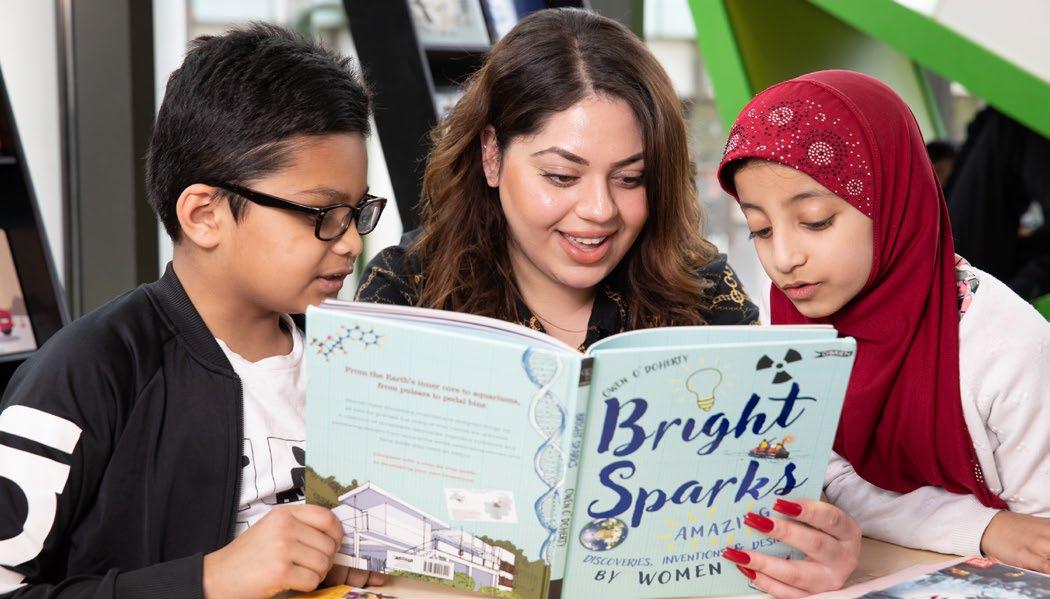
Familiesonline.co.uk Families Dorset 11 HEALTH
Speak to your GP
Get our digital mag! Sign up at familiesmag.co.uk/go IT’S FREE! 6 7 Struggling
8 9 Enrol on a mindfulness course 10 Encourage them to read
to fall asleep?
2023 life hacks for parents
 By Ellie Malt
By Ellie Malt
Honestly, cracking open the frozen spuds on Christmas morning was NOT cheating. It was efficient, it was easy and I’m addicted. So, for 2023 I’ve decided to pull the emergency cord and deploy some new life hacks. According to my darling daughters, YouTube has solutions to every problem so I’ve gone online to look. Happy hacking!
Speedy declutter


I’m skipping the part where I sift through everything I own. Instead, I’m targeting three big ticket items; a pile of wood which has been patiently awaiting a DIY project, clothes put aside for mending two years ago and some electricals I intended to sell on eBay last year. It’s time to bag them up and get to the recycling centre.
Food

I need a break from cooking, I’m hunting down alternatives. Eating out is a cheerfully obvious way out but the costof-living crisis makes this backfire. So, I’m switching meals out for take-aways or meal deals. I’ve also found two new veggie options to batch cook for the freezer to give me a cheap night off.
Paperwork
Every time the admin needs to be tackled, it really does create a general fuzz of panic. Just where is that important email from school? Scouting around on the internet I found an excellent twentyminute-high speed solution inspired by Marie Kondo on YouTube at https://bit.ly/youtube20mins




Planners
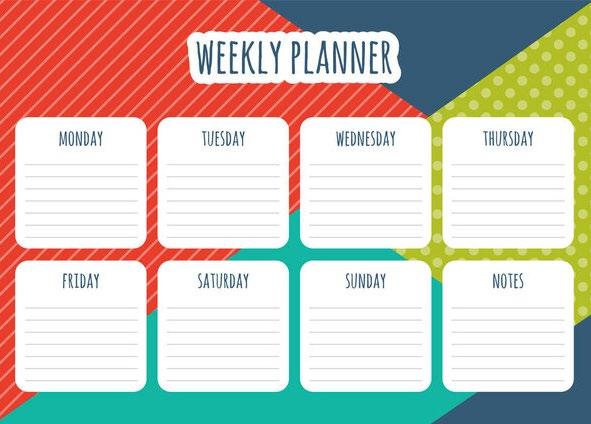
Mega playdates
If batch cooking can work for food, can it work for our social lives too? Organising and hosting lots of individual playdates is time-consuming so I’m inviting lots of friends around for one mega playdate. It’s short-term pain for long-term gain. Maybe we’ll get lots of invites in return?

I’ve switched to Google calendar from the Apple version. I find it clearer plus I can set a reminder for each task I don’t have time for on a particular day. If that doesn’t work, I’m going back to a good paperbased planner. I’ve got my eye on the perpetual planner from Moo (www.moo.com).
Gamification


Why not inject the fun principles of a video game into any activity? Set tonnes of levels or goals and then lots of tiny rewards for reaching them. Mind still wandering? How about the Apollo wearable clip (www.apolloneuro.com) that provides a gentle buzz of appreciation after achieving a flow state? We have reward charts for the kids so I’ll have one too. Gold star for me!
Prioritise


Accept help
Why is this so hard? Ironically, when it comes to accepting help, I find it easier when I’m already feeling capable. Next time I’m being an obstinate hermit who wants to go it alone, I’m going to kick that habit or maybe even reach out before arriving at the point of overwhelm.
This is where the number one life hack on www.lifehack.org can help. The ‘prioritisation matrix’ means placing all your tasks into one of four zones: do, schedule, delegate, eliminate. Eisenhower came up with this strategy for the Allied Invasion of Europe. Is that so different from running a family? Anyway, Europe was successfully liberated so perhaps it will work for me. Free template at https://bit.ly/prmatrix
Familiesonline.co.uk Families Dorset 12 NEW YEAR, NEW YOU
NEW YEAR, NEW YOU 12
New Year challenges
By Claire Winter
Every New Year we are inundated with health, fitness and self-improvement messages. Often, if we do decide to challenge ourselves and make a change, we don’t feel adequately supported and quickly lose motivation. One way of addressing this is to take on a new challenge as a family. Not only do you all have to get up off the sofa but you get to spend quality time with each other too!
Does your family thrive on a bit of competition? You could make your challenge a goalorientated one. Or perhaps you have family members who want to nail screen time, healthy eating or exercise? Call a family meeting and decide which challenge will suit you all. If you can’t decide, hold a vote! Here are some challenge ideas.

Get wild
We know that spending time in nature is good for you and science backs it up. Challenge each other to name different trees on every walk you go on, see shapes in clouds, identify birdsong; whatever it takes to draw the family into the fresh air.
The RSPB has some great wild challenge suggestions for families; check out fun and learning at www.rspb.org.uk.
Reduce screen time
If you decide as a family to spend less time on devices, there are some great apps like AppDetox or AntiSocial which can help. Plan family fun as a healthier and more inclusive use of your time.

Catch me if you can
Coach Martin Sharp (www.martinsharp.com) suggests a family running challenge. ‘You could keep it simple and see how many laps of the park you can all do. But if you want to make it more exciting you could enter a Color Run (www.colorrun.co.uk) or a Tough Mudder (www.toughmudder.co.uk) says Martin. ‘Exercise doesn’t have to be the same thing day-in, day-out; with a bit of imagination it can turn into a grand adventure.’ Make a family chart and log everyone’s goals and achievements.
Eat around the world
Bored with your normal meals? Inspire yourselves by researching healthy ingredients you’ve never tried before. Then plan a family challenge to cook meals from around the world. Everyone gets to try something they’ve not eaten before.

Be mindful
In this stressful world, taking time to ‘just be’ is so important. Try some relaxing yoga and meditation every evening for just five to ten minutes, for a month. Insight Timer (www.insighttimer. com) is a free meditation app, packed with different tracks and exercises.


Wear a Hat for a better future!
Wear A Hat Day, an iconic and fun annual event, is one of the UK’s most popular and family-friendly charitable fundraisers and it’s happening again on Friday, 31 March!

Running for more than ten years, this event raises millions for vital research into brain tumours – the biggest cancer killer of children and adults under the age of 40. Wear A Hat Day events help children explore their individuality and creativity, whilst learning to work together and think of others – in a really fun way.
Participation fosters friendships, creates better local and school communities, offers unique learning opportunities and provides new ways for children to explore ideas around different life experiences, all while giving hope to brain tumour patients and their loved ones.
Join this event, as a family or by persuading your local school to take part. Register now for more information and your FREE fundraising pack. Just use the quick and easy webform at www.wearahatday.org
Familiesonline.co.uk Families Dorset 13 NEW YEAR, NEW YOU
Dangerous things (you should let your child do)
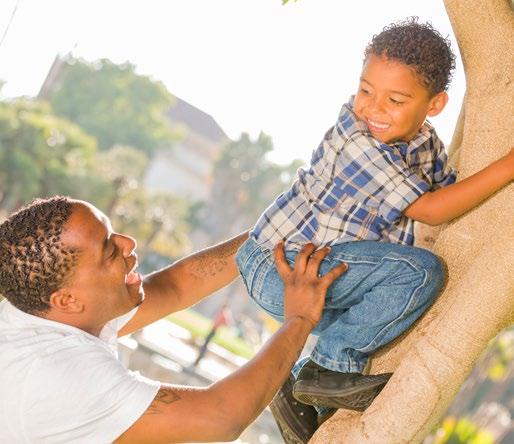
Modern technology enables children to live a largely sedentary and ‘safe’ existence. However, research by Play England shows that ‘age-appropriate risk’ is an essential component of a balanced childhood, allowing children to experience fear and learn the strengths and limitations of their bodies. So, go ahead, hold your breath and allow your kids to indulge in some ‘dangerous’ activities – of course, under the supervision of a responsible adult AT ALL TIMES.
Use a hammer
Driving a nail into wood is a valuable skill and harder than it looks. A poorly hit nail can fly up unpredictably so eye protection is vital. Show your child how to hold the hammer in the middle of the handle and keep the nail in place by holding the bottom with their finger and thumb. GENTLY tap the hammer on the top of nail. Once the nail stands up on its own, they can move their hand away and use greater force. For tips, see https://bit.ly/safehammer
Play with fire

Children find fire fascinating. In the past, it was an everyday part of family life but, nowadays, many children don’t encounter fire unless we deliberately introduce it to them. It’s better for them to learn the basics safely with you, including what to do if something goes wrong, rather than playing with fire in a riskier situation.
For step-by-step guidance, visit https://bit.ly/pwintrofire
Spend an hour blindfolded
Challenging your child to live blindfolded for an hour will teach them how to better use their other senses but also build empathy and awareness for non-sighted people. Whether you use a scarf, tea towel or large hanky, it’s important the blindfold is snug and doesn’t let in any light so your child’s other senses are activated. To try some fun blindfold games, visit www.blindfoldsensoryplay.com.au
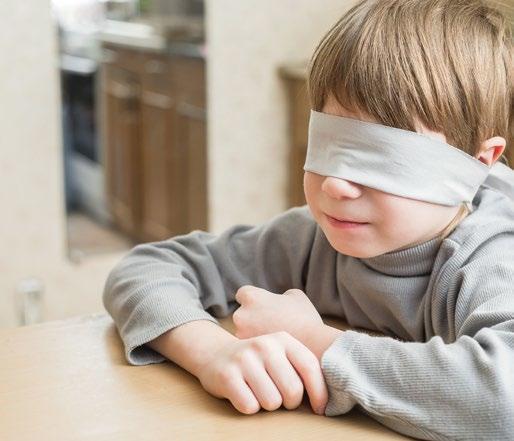
Throw rocks
It’s almost impossible to take young children for a walk in the woods or along the beach without them picking up a stick, rock or seashell and throwing it. Children love the feeling of propelling an object away from their body and watching where it goes. Channel this urge by teaching your child the situations in which it’s both fun and safe to throw an object eg skimming a stone on water.
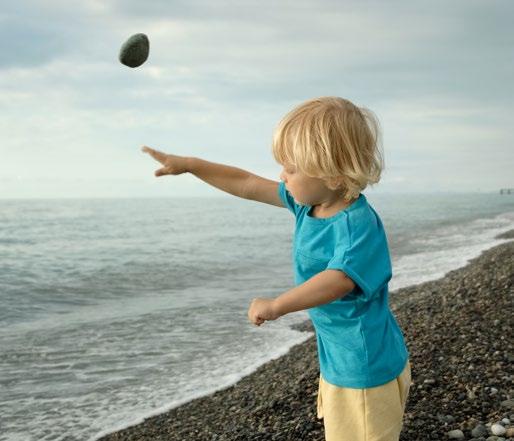
For guidance, visit https://bit.ly/NTskimstones
Use a pocketknife
Another life skill that develops with experience (and guidance) is using a knife safely.
Whittling or wood carving is fun and creative and a great way to introduce kids to safe knife skills. They will soon become proficient and able to tackle using knives in the kitchen, with your guidance.
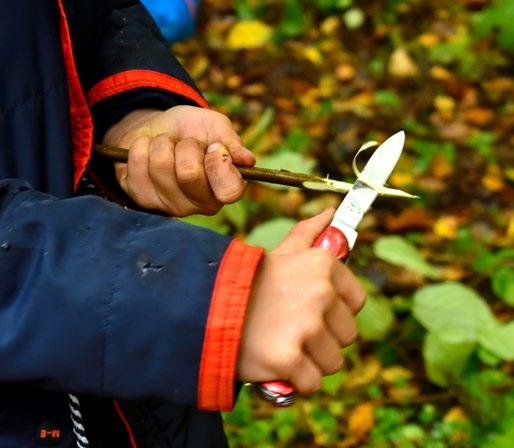
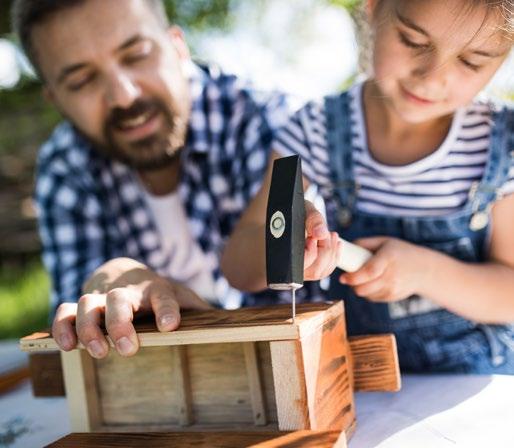
For some great tips, safety advice and simple projects, visit https://bit.ly/safewhittling
Climb a tree
Children cannot resist hauling themselves up a tree. According to many experts, this should be encouraged as it motivates children to challenge themselves in a fun and physically active way. It is, after all, the number one adventure on the National Trust’s list of 50 things to do before you’re 11¾.
For guidance on how to tackle a tree, visit https://bit.ly/NTclimb
Blow up a bottle of coke

This classic, explosive science experiment is simple but has a spectacular impact on children when the coke shoots metres into the air!
Be warned though, this experiment is very messy and sticky and must be performed outside.
Play conkers
This ancient British game has, in recent times, sometimes been regarded as unsafe.
However, it’s only really risky when played incorrectly or when children are deliberately trying to hurt each other. For anyone not in the know, the game of conkers involves using a conker on a string to try to knock your opponent’s conker off its string. For tips and advice such as when to look for conkers, how to prepare them for a game and tips on winning, visit https://bit.ly/WTconkers

Familiesonline.co.uk Families Dorset 14
PARENTING
Eureka! The National Children’s Museum has instructions and guidance at https://bit.ly/cokeexp
Tackling toddler tantrums

 By Sarah Ockwell-Smith
By Sarah Ockwell-Smith
The ‘terrible twos’ aren’t called that for nothing! This stage of a child’s life is all about big feelings. Scientifically, it relates to the undeveloped prefrontal brain cortex which means the child is unable to regulate their own emotions. What most of us refer to as a tantrum is an expression of pure frustration.
What is a tantrum?
Tantrums describe the state of an individual who is out of control, full of big emotions and stress hormones and unable to calm themselves down. Tantrums can happen at any age, right into adulthodd but, as adults with fully developed brains, we have to learn to manage our emotions, calm ourselves down or rather self soothe.
Toddlers don’t possess these skills yet. They are not being naughty or manipulative, they are simply being toddlers. Tantrums are a normal and exceedingly common feature of child development. Research has found that nearly nine in ten children between age 18 months and 2 years regularly have tantrums, with most having at least one a day, lasting on average between thirty and sixty seconds (although it is not uncommon for them to occur far more frequently and last for much longer).
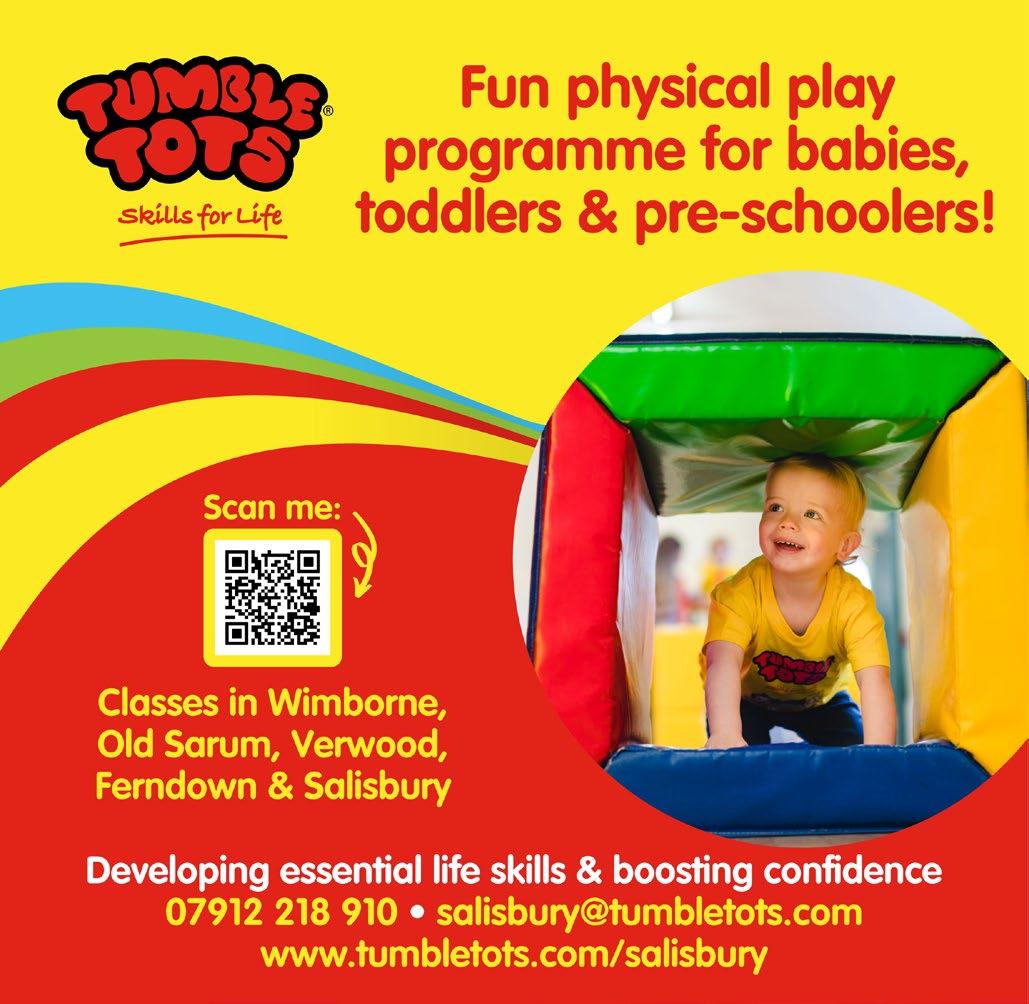
‘No’ to the naughty step
Contrary to popular belief, ignoring, shaming or punishing tantrums can make a toddler’s behaviour much worse. These approaches ignore a child’s difficult underlying feelings and don’t resolve the cause or help the toddler regulate their behaviour. Experts have discovered just how much infant brains are affected by the level of parental care they receive.

With nurturing attention, the part of their brains responsible for regulating emotion become better connected as they grow. If toddlers are constantly sat on naughty steps, sent for time outs, punished or ignored when they are perceived to be ‘naughty,’ in the long term they will lack the neurological maturity that develops as a result of empathy and guidance.
Bion’s theory of containment
In the 1960s, an English psychoanalyst named Wilfred Bion introduced his idea of using containment when children are not yet able to manage their feelings alone. The concept describes the way parents or primary caregivers hold space for a children’s big, difficult feelings like anger, frustration and anxiety during a tantrum, by reflecting calmness, control and regulation, helping the child to become calmer. Importantly, the child feels safe and understood.
Sarah Ockwell-Smith is the author of Beginnings, a book published by Piatkus, which offers a guide to child psychology and development for parents of children ages 0 to 5.
Practical steps
You cannot stop tantrums. And they are not a sign of poor parenting. Keep in mind that they are a normal, passing stage of child development, caused by immature brain development. In time your toddler will grow out of them. Until then understanding and a lot of patience is the best way forward.
Try to identify and reduce triggers to prevent tantrums where you can. This might be when your child is hungry, doesn’t want to share their favourite toy or walk a single step more.
Keep the toddler (and others) safe during the tantrum. If you can, move to a quieter space with your child. Stay calm and hold your boundary; supporting and nurturing isn’t about giving in.
Help your toddler to calm down once the tantrum is over. Distraction can be a good technique, pointing them towards something more pleasant to focus on.
The best way to show care during tantrums is to mirror calmness yourself. Easier said than done in a supermarket aisle admittedly but the rewards will be there in the long term.
Familiesonline.co.uk Families Dorset 15 EARLY YEARS
Book now to include your advert in our next issue. Call Claire on 07812 218 331 Book by 3 February.
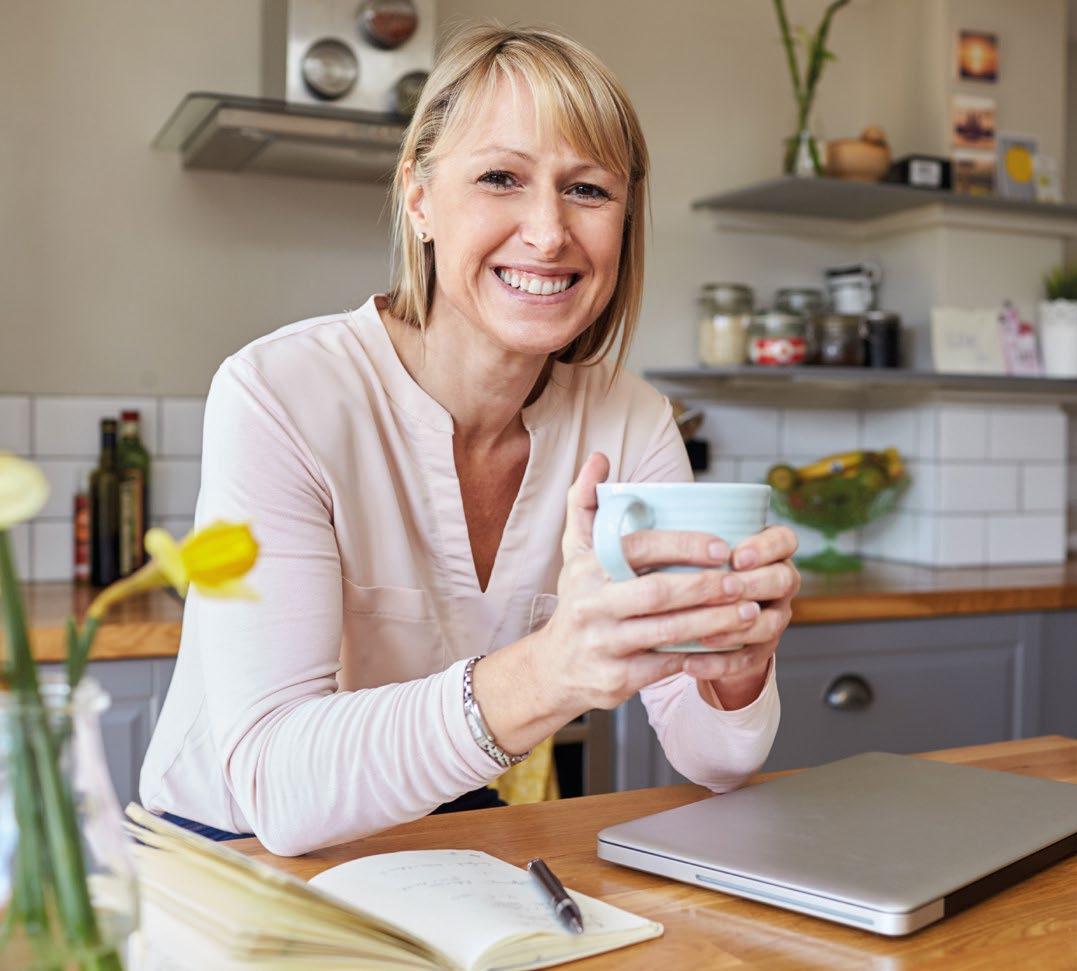




Families Dorset 16 Calling parents living in Dorset! Magazine Would you like to try your hand at magazine publishing? Are you interested in media and marketing? Do you think you can grow a business? Come and run Families Dorset magazine! Work part time from home around your family and do something you love. To find out more contact Linda at info@familiesmagazine.co.uk or call 020 8241 0423
























 By Dr Jamie Lingwood
By Dr Jamie Lingwood






 By Claire Moreau
By Claire Moreau










 By Ellie Malt
By Ellie Malt



























 By Sarah Ockwell-Smith
By Sarah Ockwell-Smith






